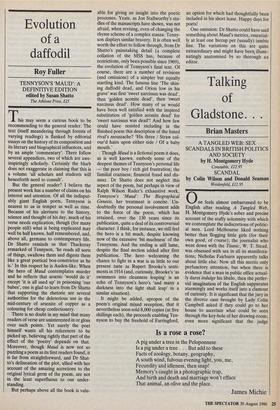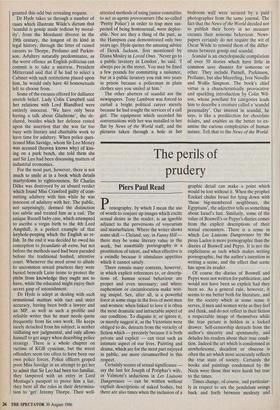Talking of Gladstone. .
Brian Masters
A TANGLED WEB: SEX SCANDALS IN BRITISH POLITICS AND SOCIETY by H. Montgomery Hyde
Constable, f12.95
SCANDAL by Colin Wilson and Donald Seaman
Weidenfeld, f12.95
0 ne feels almost embarrassed to be English after reading A Tangled Web, H. Montgomery Hyde's sober and precise account of the stuffy solemnity with which we contemplate the indiscretions of politic- al men. Lord Melbourne liked nothing better than flogging little girls (for their own good, of course); the journalist who went down with the Titanic, W. T. Stead, was obsessed with sex in all its manifesta- tions; Nicholas Fairbairn apparently talks about little else. Now all this merits only perfunctory attention, but when there is evidence that a man in public office actual- ly dares indulge his libido, then the perfer- vid imagination of the English suppurates alarmingly and works itself into a clamour of curiosity. It is significant that the jury in the divorce case brought by Lady Colin Campbell asked if they could go to her house to ascertain what could be seen through the key-hole of her drawing-room; even more significant that the judge granted this odd but revealing request.
Dr Hyde takes us through a number of cases which illustrate Wilde's dictum that `scandal is gossip made tedious by moral- ity', from the Mordaunt divorce in the 19th century, the longest of its kind in legal history, through the litter of ruined careers to Thorpe, Profumo and Parkin- son. Adultery naturally predominates, as the worst offence an English politician can commit is to take a mistress. President Mitterrand said that if he had to select a Cabinet with such restrictions placed upon him, he would only have 40 homosexuals left to choose from.
Some of the excuses offered for dalliance stretch belief. Lady Colin Campbell said her relations with Lord Blandford were entirely innocent. 'We have only been having a talk about Gladstone', she de- clared, besides which her defence rested upon the assertion that she was far too busy with literary and charitable work to have time for adultery. When police ques- tioned Miss Savidge, whom Sir Leo Money was accused (heaven knows why) of kiss- ing on a park bench, she told them she and Sir Leo had been discussing matters of industrial economics.
For the most part, however, there is not much to smile at in a book which details martyrdoms to righteousness. Sir Charles Dilke was destroyed by an absurd verdict which found Miss Crawford guilty of com- mitting adultery with him while he was innocent of adultery with her. The public, not surprisingly, deemed the distinction too subtle and treated him as a cad. The unique Russell baby case, which attempted to ascribe a virgin birth to the 4th Lord Ampthill, is a perfect example of that keyhole-peeping which the English so re- lish. In the end it was decided he owed his conception to fecundatio ab extra, but not before the methods used had been paraded before the traditional hushed, attentive court. Whenever the need arose to allude to uncommon sexual practices they were buried beneath Latin terms to protect the plebs from knowledge they ought not to have, while the educated might enjoy their secret gasp of astonishment.
Dr Hyde is adept at dealing with such sensational matters with tact and strict accuracy, having been both a lawyer and an MP, as well as such a prolific and reliable writer that he must needs quote frequently from his own work. He keeps nicely detached from his subject, is neither titillating nor judgmental, and only allows himself to get angry when describing police strategy. There is a whole chapter on victims of KGB cynicism, but the worst offenders seem too often to have been our own police forces. Police officers groped poor Miss Savidge in an attempt to get her to admit that Sir Leo had been too familiar, they tampered with an entry in Lord Montagu's passport to prove him a liar, they bent all the rules in their determina- tion to 'get' Jeremy Thorpe. Their well- attested methods of using junior constables to act as agents provocateurs (the so-called `Pretty Police') in order to trap men sus- pected of being homosexual, were deplor- able. Nor are they a thing of the past, as the Hampson case demonstrated only two years ago. Hyde quotes the amusing advice of Derek Jackson, first mentioned by Diana Mosley in Loved Ones. 'Never go to a public lavatory in London', he said. 'I always pee in the street. You may be fined a few pounds for committing a nuisance, but in a public lavatory you risk two years in prison because a policeman in plain clothes says you smiled at him.'
The other abetters of scandal are the newspapers. Tony Lambton was forced to curtail a bright political career merely because he had sought the services of a call girl. The equipment which recorded his conversations with her was installed in her flat by News of the World staff, and the pictures taken through a hole in her bedroom wall were secured by a paid photographer from the same journal. The fact that the News of the World decided not to publish their booty in no measure excuses their noisome behaviour. News- papers certainly do not require the wit of Oscar Wilde to remind them of the differ- ences between gossip and scandal.
Scandal is an encyclopaedic compilation of over 50 stories which have little in common save disaster for someone or other. They include Parnell, Parkinson, Profumo, but also Mayerling, Ivor Novell° and Wallis Simpson. The book's chief virtue is a characteristically provocative and sparkling introduction by Colin Wil- son, whose penchant for categories leads him to describe a creature called a 'scandal personality'. Our interest in scandal, he says, is like a predilection for chocolate éclairs, and enables us the better to ex- amine the curious complexities of human nature. Tell that to the News of the World.









































 Previous page
Previous page